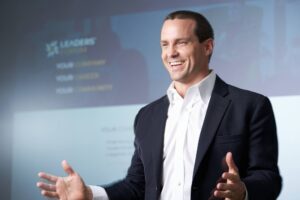A Discussion with Chris Turnley

A several-time CRO talks to 7 heads of sales…. Here’s what he shared.
In our Leaders’ Forum, sales leaders come together to learn together, to grow in their careers, and to push their companies forward. It’s not just the founders/CEOs who are full of fire; the sales folks want to make hay, too. And they get after it. Just from a different perspective.
Once or twice a year, we take a little survey: what sort of information does the group want more of? One of those answers was, “I want to hear from a serious, dyed-in-the-wool CRO about the job, what it takes, and how to advance in my career.”
Enter Chris Turnley.
First, he’s a GREAT dude with a big heart. There are a lot of goobers in the commercial world, and Chris couldn’t be further from that. The guy is awesome, and if you have a chance to work under him, for him, or with him, take it. It’d be a staggering investment personally and professionally.
Second, he’s got the credentials. He’s currently EVP of Member Experience at University Federal Credit Union, where 650 people report up to him. He’s also an advisor to 6 companies in various industries. Prior to UFCU, he co-founded DOSH, and had served as fractional CRO for multiple companies working on their go-to-market plans. He was a piece of WP Engine’s growth when he ran revenue there, and that followed a stint as SVP North America for Iron Mountain. He’s learned some things along the way. And unlike politicians and some football coaches, he hasn’t failed up. He did the work.
So there’s the background. Let’s dig into what he shared.
“I know how to do three things.”
“And I do those things in every room I’m in.” Fortunately for the rest of us, those can be learned.
- “I ask, ‘Is there a market for the product?’ If lead gen can’t bring in some real customers, then you don’t need to worry about a sales team. You need to focus on nailing the message, OR, more likely, getting the product right so leads come.”“I ask, ‘Is the product ready for a sales team?’ The team needs to be matched to the maturity of the product, the market and the company. If you’re building from scratch, you can do that. And it’s ok, even good, for the sales team to be a little behind the product.”Note on this: this is wiser than trying to have a team lead the product. Think about this sports analogy: I’d rather have a great system for average athletes to execute (i.e. military academies and the triple option) than getting great athletes to run an average system. It’s harder to get great talent; a great system is more controllable and has fewer variables than a world-class team.
- “I remind people that alignment always leads to growth.’ Long ago, I had a head of sales fighting with a head of marketing. I said, ‘We’re not doing this again. What needs to happen so we don’t have this fight anymore about leads and closing? How do we get on the same page, whether comp or credit or what?’ Who cares who gets the credit? Do we need to change how we look at marketing, or leads or close ratios? I throw everything on the table that blocks us from having real conversations with each other. The only thing that really matters is our revenue mark. That enables us to align all roles and teams to what is most important.”
- “I want data to have a seat at the table. It’s not the only seat. And it’s not every seat. How do we keep data AND the voice of the customer, in the same room?”
“On motivation. And inspiration.”
“Motivation and inspiration are different. Motivation says, ‘You do X, you get Y.’ But inspiration is where you get someone’s discretionary effort, it’s where you unlock their heart and mind.”
“Bigger customers are really demanding.”
“Everyone wants to move into the enterprise customer. But I ask, ‘Are you sure you’re ready?’ Because big companies – really big companies – are really demanding. They need a lot of service. They don’t pay right away, typically at least net 60. It strains your resources financially and from a personnel standpoint. It’s better to ask, ‘Can you currently support the deals you’re doing if sub-enterprise?’”
“Marry your problems and date your solutions.”
“When going to market, we fall in love with our solution. We need to be in love with the problem, and we need to elevate our discussion to the problem we want to solve.”
Chris said this for taking products/services to market, but he also suggested it’s a way to think about problems internally. Or I inferred he did. For instance, there’s a problem that needs to be solved. Too often, executives have a preconceived notion of the right solution and commit to it prior to fully understanding the problem.
On professional development.
When we asked Chris, what hard skills did you develop?, Chris replied with this.
“Learn how to synthesize data. Again, it needs to have a seat at the table. I’m a relationship guy, but I learned I needed to understand data.”
“Second, you gotta understand finance. Understand the balance sheet, the P&L, and forecasts.”
“I got there because I made a decision to be good at this. Most of my learning takes place on the job, but I read a lot, I listen to podcasts. Recently, I read and liked, It’s the Manager and Eight Paradoxes of a Leader.”
Closing thoughts
“Sales and leadership require so much of you. It doesn’t work if you’re not committed. People know if you’re not all in. When I’m at work, I’m 100% there. When I’m at home, I’m 100% there. When I’m selling, I’m all in.”
You can follow Chris here.




